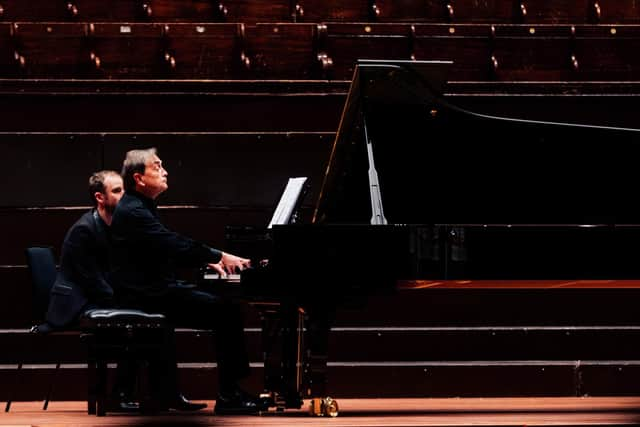Edinburgh International Festival music reviews: Jeff Mills: Tomorrow Comes the Harvest | Pierre-Laurent Aimard | Chineke! Chamber Ensemble


Jeff Mills: Tomorrow Comes the Harvest, Leith Theatre ****
In its 75th year, the Edinburgh International Festival can surely be hailed for breaking quirky new ground as the Leith Theatre rang to the clubbers’ chant of “one more tune”. The recipient of the request was Jeff Mills, best known for his pioneering work as a Detroit techno DJ, and there was an appropriately sweaty club atmosphere at this show on the hottest day of the festival so far.
However, Mills was in town not to DJ but to present his current band project, Tomorrow Comes the Harvest, initially conceived as a collaboration with the late, legendary Afrobeat drummer Tony Allen, and brought to live fruition with Allen's wingman Jean-Phi Dary on an armoury of keyboards and a revolving roster of musicians Mills knows can improvise.On this occasion, tabla player Prabhu Edouard completed with the line-up, with Mills himself on keyboards, sequencer and congas at the ready should the spirit move him.


Advertisement
Hide AdMills describes the project as improvised electronic jazz and sees it as a means of post-pandemic reconnection. From the ecstatic reaction of the audience, Mills needed no reintroduction – this was a veteran clubbing crowd, here to move their feet, and the trio responded with a seamless performance that evoked the ebb and flow of a club set with its pattern of breakdowns and crescendos.
Mills provided the skittering electronic pulse, Dary the glistening keyboard noodling and Edouard some konnakol vocal percussion and devotional chanting. Latin jazz and eastern melodic traditions were laced into the sound palette, while a martial drumbeat evoked a celebratory parade. A sudden acceleration in bpm provoked great excitement in the room and delivered the most forceful fiesta feeling of the set. And there was indeed one more tune, a techno-inspired coda with Mills on those congas. Fiona Shepherd
Pierre-Laurent Aimard, Usher Hall ***
One has to wonder why festival programmers invited one of contemporary music’s foremost pianists to play Renaissance, Baroque and Classical repertoire. Pierre-Laurent Aimard is a technically superb and talented pianist, but in Fantasies and Pilgrimages, his interpretations were ponderous and lacked a sense of direction.
The first half was devoted to fantasies, largely improvisatory pieces composers performed to show off. However, Aimard’s ornamentation in Sweelinck’s Fantasia Chromatica was leaden rather than florid, and he failed to deliver the sparkle CPE Bach surely intended in his C major Fantasia. Even Mozart’s C minor version of the form sounded dull as the pianist’s funereal tempo flattened the more dramatic and playful moments. Beethoven also liked to tease the listener and the last laugh in his Fantasia was nicely delivered by Aimard.
After the interval, Aimard played pieces from Liszt’s musical travelogue Années de Pélèrinage. It’s an introspective journey with the threnodies Aux Cyprès de la Villa d’Este I and II freighted with sadness, while there was an air of unrelenting doom in Vallée d’Obermann. There was at last a flash of brilliance and exhuberance in Aimard’s depiction of the shimmering water from the fountains in Les Jeux d’Eaux à la Villa d’Este. Susan Nickalls
Chineke! Chamber Ensemble, Queen’s Hall ***
True to the mission of its parent body, the flexible Chineke! Chamber Ensemble – a subset of the enterprising Chineke! Orchestra – presented music reflecting its bold cultural ambitions. Works by African-American and Aboriginal composers dominated the opening half, complemented by Mendelssohn’s Piano Sextet Op. 110 in the second.
Advertisement
Hide AdIf that sounds like a game of two halves, it was. There was undoubted fascination in discovering such un-championed names as William Grant Still and Valerie Coleman, the former’s Folk Suite No. 1 inoffensively attractive but straying little beyond its recognisable sources, Coleman’s jazz-influenced Red Clay and Mississippi Delta displaying greater, if more austere, contemporary inventiveness.
An antipodean shift to Ngarrgooroon – Woven Song, by native Australian Deborah Cheetham, offered more ambitious, cinematic soundscapes, magical in parts, but less interesting structurally. So it was left to didgeridoo player and composer William Barton to lift the bar, not so much in the advertised Rising of Mother Country, where his interaction with the ensemble was largely subdued, but in an additional rock-inspired piece in which he also sang and played guitar. That was cool.
The Mendelssohn Sextet found its piano and string players wholly invigorated and, bar a late skirmish, proved a transformative conclusion. Ken Walton